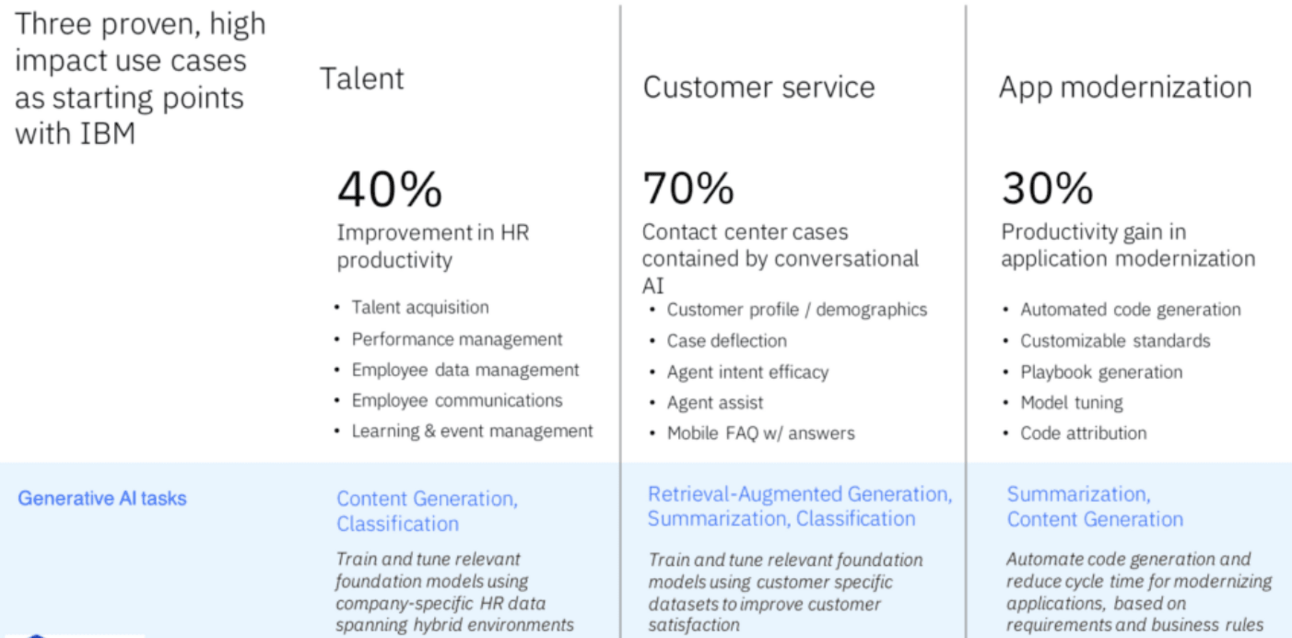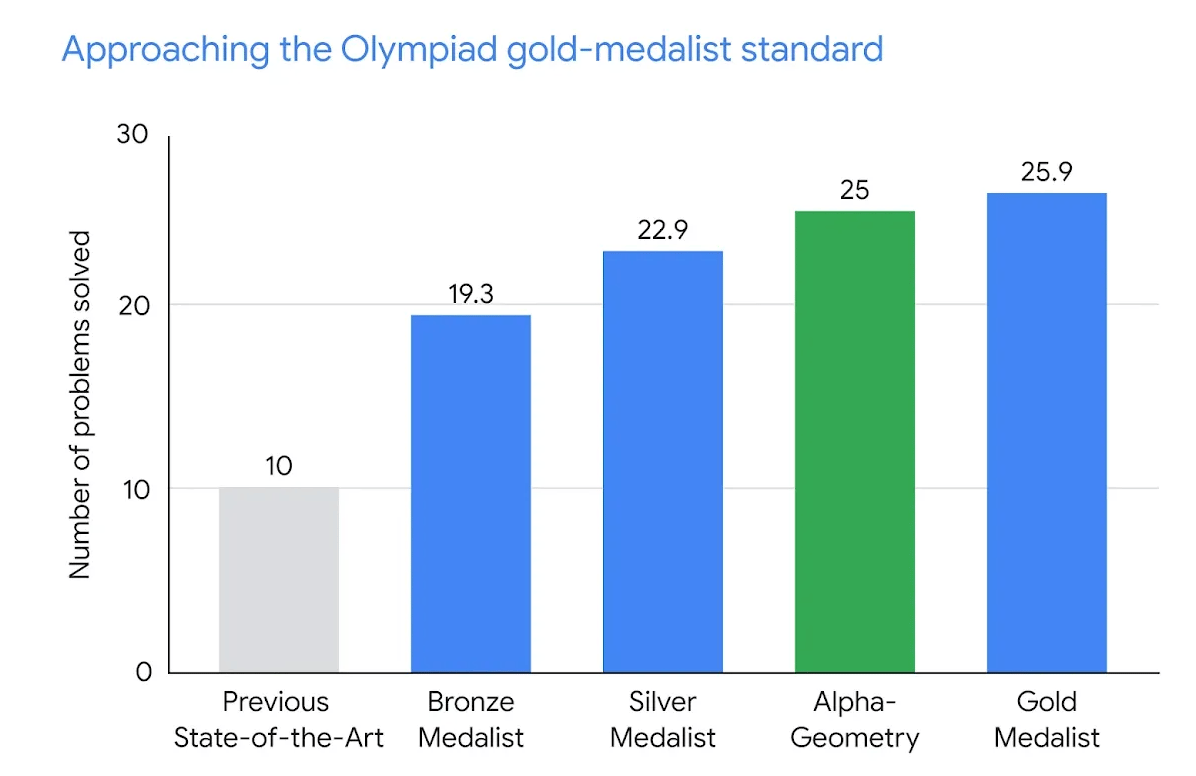- The Intelligence
- Posts
- AI humanoids are about to take over 🤖 Week 4
AI humanoids are about to take over 🤖 Week 4

AI humanoids are about to take over 🤖
Hey there!
We hope you had a great weekend and are ready to crush this week. Last week went by and again A LOT has happend in AI.
In this week’s newsletter we’ll discuss the challenges businesses are facing with implementing AI and that humanoids might be the 2024 AI narrative. Of course we also have all the latest news of other developments.
Table of contents
🦾 Humanoids are seriously becoming a thing now 🤔
OpenAI allows their tech to be used by the military 💣
Mark Zuckerberg has his eyes set on something new: AGI 👁️
AI implementation in businesses 🏬
Microsoft Copilot is gaining momentum 🚀
AI just became better at its biggest challenge: math ➗✖️
Updates
Humanoids are seriously becoming a thing now
The race to perfect the humanoid form factor is expected to be one of 2024's defining tech stories, with companies like Tesla, Apptronik, Figure, and Agility competing in the space. Norwegian firm 1X, backed by OpenAI, has raised a total of $125 million in funding, including a recent $100 million Series B round led by EQT Ventures. The company's focus is on its humanoid robot, NEO, which aims to address global labor shortages by navigating environments built by and for humans. However, there are detractors who argue that such systems are over-engineered or that true general-purpose functionality is further off than anticipated. The funds raised will be used to enhance 1X's Embodied AI offering and go-to-market for NEO, as well as to compensate the company's dedicated team.
Figure, a California-based company developing autonomous humanoid robots, has signed a commercial agreement with BMW Manufacturing Co., LLC to deploy general purpose robots in automotive manufacturing environments. The collaboration aims to:
Automate difficult, unsafe, or tedious tasks in the manufacturing process, allowing employees to focus on skills and processes that cannot be automated.
Continuously improve production efficiency and safety.
Increase productivity, reduce costs, and create a safer and more consistent environment.
Under the agreement, BMW Manufacturing and Figure will pursue a milestone-based approach, starting with identifying initial use cases for Figure robots in automotive production. Once the first phase is completed, the Figure robots will begin staged deployment at BMW's manufacturing facility in Spartanburg, South Carolina. Additionally, the two companies will jointly explore advanced technology topics such as artificial intelligence, robot control, manufacturing virtualization, and robot integration.
OpenAI news: military, elections and universities
OpenAI has recently changed its policy to allow military applications of its technologies. The previous policy prohibited the use of its products for "military and warfare" purposes, but this language has been removed, and OpenAI has confirmed that the change was made to accommodate military customers and projects the company approves of. The policy update aims to provide clarity and the ability to have discussions about national security use cases that align with OpenAI's mission. For example, OpenAI is already working with DARPA to create new cybersecurity tools to secure open-source software that critical infrastructure and industry depend on. The company's policy still prohibits the use of its tools to harm people, develop weapons, for communications surveillance, or to injure others or destroy property.
OpenAI is preparing for the 2024 worldwide elections by focusing on protecting the integrity of elections and ensuring their technology is not used to undermine the democratic process. Their approach includes:
Preventing abuse: Anticipating and preventing relevant abuse, such as misleading deepfakes, scaled influence operations, or chatbots impersonating candidates. They have a cross-functional effort dedicated to election work, bringing together expertise from various teams to quickly investigate and address potential abuse.
Transparency around AI-generated content: Implementing the Coalition for Content Provenance and Authenticity's digital credentials for images generated by DALL·E 3 and experimenting with a provenance classifier to detect images generated by DALL·E. ChatGPT is also increasingly integrating with existing sources of information, providing real-time news reporting globally, including attribution and links.
Collaboration with organizations: In the United States, OpenAI is working with the National Association of Secretaries of State (NASS) to direct users to CanIVote.org, the authoritative website on US voting information, when asked certain procedural election-related questions.
OpenAI aims to continue evolving their approach as they learn more about how their tools are used and to work with partners to anticipate and prevent potential abuse in the lead-up to the 2024 global elections.
OpenAI has announced its first partnership with a higher education institution, Arizona State University (ASU). Starting in February, ASU will have full access to ChatGPT Enterprise, which will be used for coursework, tutoring, research, and more. The partnership has been in development for at least six months. ASU's Chief Information Officer, Lev Gonick, expressed confidence in the privacy and security features of ChatGPT Enterprise, stating that any prompts inputted by the ASU community will remain secure and that OpenAI does not use this data for its training models. OpenAI's Chief Operating Officer, Brad Lightcap, mentioned that the company is eager to learn from ASU and expand the use of ChatGPT in higher education institutions.
Mark Zuckenberg’s new goal: AGI
Mark Zuckerberg, CEO of Meta, has announced his new goal of creating artificial general intelligence (AGI), a superhuman, god-like intelligence that can reason and have intuition. He believes that achieving AGI is a gradual process rather than a single moment and has moved Meta's AI research group, FAIR, to the same part of the company as the team building generative AI products across Meta's apps. This move aims to make AI breakthroughs more directly accessible to its billions of users.
The race for AGI involves other tech giants like OpenAI and Google, and the competition for AI talent has never been more intense. Zuckerberg has revealed that by the end of the year, Meta will own more than 340,000 of Nvidia's H100 GPUs, the industry's chip of choice for building generative AI. This will give Meta a stockpile of almost 600,000 GPUs by the end of 2024, making it one of the largest AI capacity builders. Zuckerberg's vision for AGI includes an open-source approach, which he believes will address issues related to unequal access to opportunity and value. However, he has not committed to open sourcing AGI if it is ever achieved at Meta. Despite the focus on AI, Zuckerberg insists that Meta is still committed to the metaverse and its Reality Labs initiative, with plans to integrate generative AI into its hardware efforts.
🤔 Discussion of the week 🧠
AI adoption has grown exponentially in recent years, and it has become a critical aspect of businesses across various industries. IBM's VP of Software and Technology Raj Datta and Director of Startups Kylie Rutherford shared insights on how AI is changing the game for companies of all sizes.
Companies are having trouble with Scaling AI. 86% of CXOs say they will adopt AI, but 79% struggle to ensure their AI models are responsible, secure, and free of bias. Many early-stage companies face issues with modeling and biases, while organizations lack the necessary skill sets to fully embrace AI. As leaders adopt AI, they need to concentrate on creating a competitive advantage, scaling AI across the business, and advancing trustworthy AI (compliance, security, and responsibility).
IBM has identified three high-impact use cases for AI: talent acquisition and management, customer service, and app modernization. These use cases demonstrate the potential for AI to improve productivity, reduce costs, and enhance user experiences.

Three High impact use cases
In conclusion, AI presents an unprecedented opportunity for businesses to gain a competitive advantage, and it is crucial for organizations to embrace the change and focus on scaling AI across their operations while ensuring compliance, trustworthiness, and responsibility.
More updates
Microsoft Copilot is gaining momentum
Microsoft has launched Copilot Pro, the most advanced and fastest version of Copilot, as a paid subscription for individuals at $20 per month per user[1]. Copilot Pro offers a higher tier of service for AI capabilities and brings Copilot AI capabilities to Microsoft 365 Personal and Family subscribers. Key features of Copilot Pro include a single AI experience that runs across your devices, understanding your context on the web, on your PC, across your apps, and soon on your phone. You’ll have access to Copilot in Word, Excel, PowerPoint, Outlook, and OneNote on PC, Mac, and iPad for Microsoft 365 Personal and Family subscribers. The subscription als grants priority access to the very latest models, including the new OpenAI’s GPT-4 Turbo, with access to GPT-4 Turbo during peak times for faster performance and the ability to toggle between models to optimize your experience. It also includes enhanced AI image creation with Image Creator from Designer (formerly Bing Image Creator), which is faster with 100 boosts per day and offers more detailed image quality and landscape image format. Finally you’ll have the ability to build your own Copilot GPT, a customized Copilot tailored for a specific topic. Very similar to the OpenAI GPT’s
Is a ChatGPT+ account even needed anymore?
Google Deepmind’s new math AI
AlphaGeometry is an AI system designed to solve complex geometry problems at a level approaching a human Olympiad gold-medalist, marking a breakthrough in AI performance. The system combines the predictive power of a neural language model with a rule-bound deduction engine, which work together to find solutions.

Comparison of the new system compared to Olympiads
The development of AlphaGeometry demonstrates AI's growing ability to reason logically and discover and verify new knowledge. The system's code and model have been open-sourced, with the hope that it will open up new possibilities across mathematics, science, and AI.